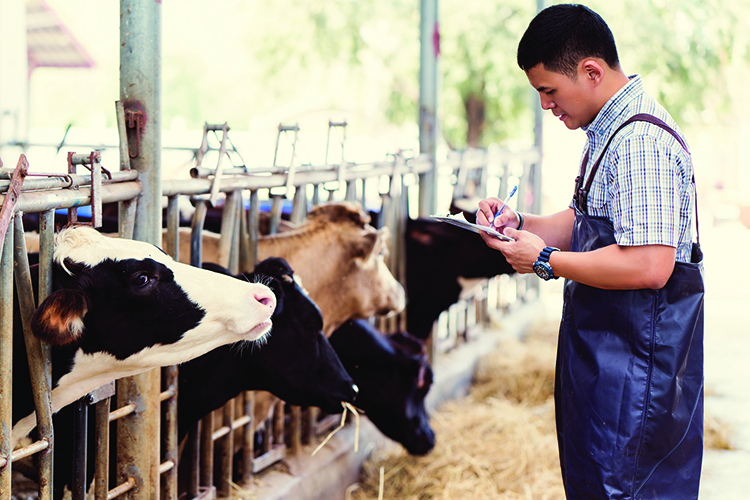
The business of milking cows has certainly consolidated. Just because there are fewer dairy farms does not mean that there is not room for young people who want to milk cows as a career. With the desire, interest, a plan, and patience, a young person can be part of this industry.
To be certain, the balance sheets on a modern dairy farm have gotten bigger and now feature a lot of zeros behind the asset and liability numbers. Entering the dairy business is possible from a multitude of avenues. Here are some of the many considerations and steps toward becoming a future dairy producer.
Knowledge is the first step. Regardless if a young person has grown up on a farm, has been on a relative’s farm, or just has the desire to farm, getting a post-high school education is the start. This could be on an agricultural campus working toward a four-year degree, a technical-type college, or a farm short course.
Understanding modern scientific farming concepts is extremely important. A focused effort to learn mathematics, computer science, and communication in writing, reading, and speaking will serve a young person well.
Right along with taking part in formal education, getting to know fellow students from dairy farms will be an additional benefit. This allows the opportunity to see a multitude of farms. For example, spending a weekend or school break working alongside fellow classmates on their family farms will make classroom learning come alive.
As a student, find out what internship programs are available. This could be a mentoring program with one of the professional dairy organizations. Many farms are looking for summer help as well. This is a great time to work a few months on a modern dairy farm of your choice.
Students have found traveling to other states and countries has broadened their total knowledge of farming. Along the way, they have found many new friends in states and countries that they later return to for visits. Make sure questions are asked about these kinds of experiences.
Once a formal education is completed, consider working full time on a well-run dairy for continuing educational experience. There are many skills to master. Good dairy owners are willing to help train young people even if they know their ultimate goal is to have their own dairy farm one day.
If the young person can go back to a family or relative’s farm to start their dairy career, at this point they should be off to a good start. For those who do not have family ties, finding a full-time job at a prominent farm is a place to park for awhile.
Some dairy owners may not have family members interested in the dairy. This can be a real long-term opportunity to start putting in time to see if future ownership by gradual buy-in could take place.
Sometimes there can be an arrangement to receive heifer calves as part of wages. Other arrangements have been made for employees to buy their own cows and place those cows in with the herd on the farm. After a five-year period of time, if both parties see a definite interest, a vested purchase can begin and legal paperwork drawn up.
Invest in cows first
The best place for a young dairy producer to invest what money they have is in cows. After all, the milk cows generate the income 365 days a year. Starting out even with a small herd of cows on a rented facility can allow a young dairy person to begin building equity.
This is where the education pays off in understanding farm financials. Knowing that buying and investing in assets that produce a steady income and replace themselves like cows is the first place to put your money. Buying new pickup trucks, machinery, buildings, and land can wait for later years when the budget allows.
There are truly a number of ways to milk cows today, and that trend will only continue in the future. A young dairy producer will need to look at the different business models and lifestyles that accompany them to gain an understanding of what direction will suit them best.
Conventional dairy operations are common and lend themselves to larger production methods and efficiencies that come along with cow comfort freestalls and milking facilities.
Grazing farms are another choice. They keep cows on rotated pastures during the warmer months of the year. Organic dairy producers have found higher milk prices in selling to this niche milk demand area. Higher input costs, specific management practices, and at times limited entrance to processors are part of this style of milk production.
A loan may be necessary
Due to the need for capital on a dairy farm, borrowing money is just a part of doing business. It is not unusual on a conventional dairy farm to have $10,000 to $25,000 invested per cow.
A good place to begin is getting to know the staff at the area USDA Farm Service Agency (FSA) office. They have lending programs specifically available for new producers. For example, $300,000 is available for the purchase of personal property such as cattle and machinery. They also have another $300,000 available for the purchase of buildings and/or land. The interest rates are very low compared to what the cost of borrowing money is at other lenders.
FSA also has some longer term repayment or amortization terms that they can offer beginning farmers. Personal property loans have amortizations of seven to 15 years with real estate loans extending from 20 to 40 years. These long-term repayments require lower principle payments allowing for more money to be used for the farm cash flow.
The loan to collateral requirements are also relaxed with the possibility of a loan that is up to 100 percent of the collateral value. FSA does require proper paperwork to be completed, including an application. This is no different than what any other lender requires.
It is important for young dairy producers to get to know other agriculture lenders as well. Finding out what lending policies and requirements exist is important for current and future borrowing. Specific agricultural lenders such as banks, Farm Credit, and credit unions have an interest in borrowing money to farmers.
It will be important to seek out lenders that have agricultural loan officers that understand farming. Lenders have options with FSA guarantees for up to a $1,400,000 with a 90 percent guarantee on the loans. This allows a lender to borrow money with only a 10 percent risk. Some lenders have special beginning farmer programs as well with special rates. Make sure you ask plenty of questions.
There is a need for young producers in the dairy industry as others age and retire. Having a real passion for cows and the business end of the industry is a great place to start.
Getting started in dairy article series: This article series explores what it takes to get started in dairy farming. The next three articles will look at examples of young people who got their start in different ways.
- This issue: There’s room for young people in dairy
- March 10: Building her brand
- March 25: Starting a dairy takes a community
- April 10: When friends become farmers









